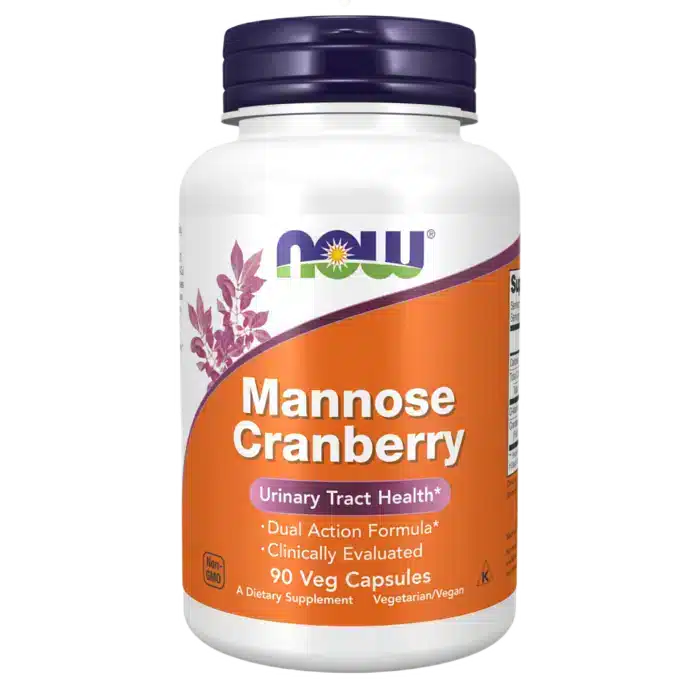Sold out
Sale
Mannose Cranberry 90vcap - Now
€34,50 EUR
€52,54
Unit price
/
Unavailable
Mannose Cranberry 90vcap - Now is backordered and will ship as soon as it is back in stock.
Description
Description
Mannose Cranberry 90vcap - Now helps fight E. coli.
Complements the treatment of urinary tract infections caused by Echerichia coli (Cystitis) and minimizes relapses.
- Red Cranberry Extract and D-Mannose
- Reduce the adhesion of bacteria such as E. coli to the walls of the Urinary Tract
- Traditionally used in Cystitis
- Potential diuretic action
- Clinically tested
Mannose Cranberry is indicated as an adjunct in the treatment of cystitis (urinary tract infection). It appears to reduce inflammation and relieve common symptoms of this infection, such as urgency to urinate, pain, and burning during urination.
The berries of the red cranberry (Vaccinium macrocarpon), present in this formula, contain compounds that help prevent and treat urinary tract infections. Mirtilin is attributed with antibacterial action, and is currently accepted as a treatment for low-recurrence urinary tract infections. Cranberry has urinary antiseptic action by preventing bacteria from adhering to mucous membranes, reducing the likelihood of infections. It effectively helps fight urinary tract infections, has antiviral action, and increases the activity of cyclooxygenase (an essential enzyme for prostaglandin production). Urinary tract infections are a very prevalent health problem in women, the elderly, and children, and are most often caused by the bacterium Escherichia coli.
For infection to occur, environmental conditions must be met for bacteria to multiply. Once in the urinary system, E. coli bacteria attach themselves to the bladder wall, where they multiply and can reach the kidneys. The wall of each E. coli cell has finger-like microprojections known as fimbriae that end in lectins (glycoproteins). Lectins have the ability to bind more deeply to the cells lining the urethra, bladder, and kidneys, preventing the bacteria from being washed away by urination and instead attaching themselves to the walls of these organs and the urinary tract, where they form colonies and cause infections.
NOW Mannose Cranberry offers not only a cranberry extract, rich in phenolic compounds known as Proanthocyanidins (PACs), whose minimum intake of 36 mg per day "Helps reduce the adhesion of certain bacteria of the E. coli species to the walls of the Urinary Tract", according to AFSSA (French Agency for Food Safety), but also D-Mannose, a simple sugar like glucose, which is found naturally in some plants, but which does not behave like a sugar in the body, as the body metabolizes it in small quantities. In fact, when consumed in large quantities, it is filtered, almost in its entirety, by the kidneys into the urine, being easily excreted by the body, so that, in the blood level, it is found in a concentration 100 times lower compared to that of glucose.
D-mannose is not an antibiotic, so it does not kill beneficial or pathogenic bacteria, but it may help inhibit the abnormal attachment of Escherichia coli (E. coli) bacteria.
90 vegetarian capsules
Complements the treatment of urinary tract infections caused by Echerichia coli (Cystitis) and minimizes relapses.
Mannose Cranberry 90vcap - Now
- Red Cranberry Extract and D-Mannose
- Reduce the adhesion of bacteria such as E. coli to the walls of the Urinary Tract
- Traditionally used in Cystitis
- Potential diuretic action
- Clinically tested
Mannose Cranberry is indicated as an adjunct in the treatment of cystitis (urinary tract infection). It appears to reduce inflammation and relieve common symptoms of this infection, such as urgency to urinate, pain, and burning during urination.
The berries of the red cranberry (Vaccinium macrocarpon), present in this formula, contain compounds that help prevent and treat urinary tract infections. Mirtilin is attributed with antibacterial action, and is currently accepted as a treatment for low-recurrence urinary tract infections. Cranberry has urinary antiseptic action by preventing bacteria from adhering to mucous membranes, reducing the likelihood of infections. It effectively helps fight urinary tract infections, has antiviral action, and increases the activity of cyclooxygenase (an essential enzyme for prostaglandin production). Urinary tract infections are a very prevalent health problem in women, the elderly, and children, and are most often caused by the bacterium Escherichia coli.
For infection to occur, environmental conditions must be met for bacteria to multiply. Once in the urinary system, E. coli bacteria attach themselves to the bladder wall, where they multiply and can reach the kidneys. The wall of each E. coli cell has finger-like microprojections known as fimbriae that end in lectins (glycoproteins). Lectins have the ability to bind more deeply to the cells lining the urethra, bladder, and kidneys, preventing the bacteria from being washed away by urination and instead attaching themselves to the walls of these organs and the urinary tract, where they form colonies and cause infections.
NOW Mannose Cranberry offers not only a cranberry extract, rich in phenolic compounds known as Proanthocyanidins (PACs), whose minimum intake of 36 mg per day "Helps reduce the adhesion of certain bacteria of the E. coli species to the walls of the Urinary Tract", according to AFSSA (French Agency for Food Safety), but also D-Mannose, a simple sugar like glucose, which is found naturally in some plants, but which does not behave like a sugar in the body, as the body metabolizes it in small quantities. In fact, when consumed in large quantities, it is filtered, almost in its entirety, by the kidneys into the urine, being easily excreted by the body, so that, in the blood level, it is found in a concentration 100 times lower compared to that of glucose.
D-mannose is not an antibiotic, so it does not kill beneficial or pathogenic bacteria, but it may help inhibit the abnormal attachment of Escherichia coli (E. coli) bacteria.
90 vegetarian capsules



